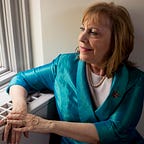Is There an Easter Beyond COVID-19?
When I was a child, Palm Sunday always served up a feast for my imagination. To underline the suffering of the crucifixion, churches draped the statues of saints and Christ on his cross in purple cloth, inserting an added plume of mystery into the atmosphere.
I liked how you got something to carry home — slender green reeds, solemnly blessed, from an exotic tree that, growing up in northern New Jersey, I had only seen in picture books.
There will be none of that today. Like an intruder in the night, COVID-19 has shuttered churches. Across the world, the virus has wreaked fear, suffering and an incomprehensivle amount of death. Beyond the devastation of this moment, are we able to see our way ahead — to something intangible, valuable, perhaps even beautiful?
Can we see beyond to Easter?
Palm Sunday marks the ending of the Lenten season, a time of prayer, penance and reflection. It has been a Lent like no other. Back in February, when we heard the familiar Ash Wednesdy admonition, “Remember you are dust and unto dust you shall return,” who could have imagined a deadly threat was rounding a corner.
The necessity of sheltering in place has removed us from the usual vortex of daily life. It introduced a forced stillness. During this time, I have became reacquainted with myself. And that has brought with it a hard look at the person I’ve been.
The biggest question I grapple with is not whether I could have written more books, or won more awards, or traveled to more places. The question that haunts me now is, how much did I love?
St. Benedict, the founder of western monasticism, wrote that the life of a spiritual seeker should involve “a constant Lent.” He cautioned that most people don’t have the grit for that.
For those of us like me, who lack the required fortitude, he recommended “devoting (oneself) to prayer with tears,” to “self-denial” and “compunction of heart.”
I never really understood what St. Benedict meant by all that. Now, with this crisis I do. I cry daily over the images of health care workers bravely putting their lives on the line to save others. Of coffins lined up in Italy and other hard-hit places. Of family members grieving the loss of a parent, a spouse, a brother, a sister who died alone.
I used to derive a great deal of comfort in attending daily Mass at a local parish. I can’t step inside a physical church at this time, but my concept of church is expanding.
I use a prayer booklet called “Give Us This Day” to reflect on the daily Mass readings. Instead of listening to a priest’s often tepid homily, I reflect in my heart, in my own home, on the gospel message.
Though monasteries are no longer open to guests during the pandemic, I can keep up the tradition of Morning and Evening Prayer by praying the Psalms over Zoom with friends who love the monastic prayer tradition as much as I do.
It isn’t the same as praying in person with a monastic community, but it has been a source of comfort nonetheless.
This new normal has caused me to reflect on what church really means and its grounding in the Latin word “ecclesia” and the Greek word “ekklesia.” Both mean “to call out.”
It is a reminder that church isn’t merely a place. It is a state of mind that calls us out of ourselves to a recognition that we are part of something vaster, more mysterious and more significant than ourselves.
My friend, the author Shirley Showalter, comes from the Mennonite tradition. She wrote recently of having a vision for Easter Sunday of leaders from various faith traditions, in a symbolic gesture, throwing open the doors of churches, temples, synogogues and mosques simultaneously on social media in a display of interfaith unity.
Shirley is also quick to point out that many in the Mennonite and Quaker traditions avoid using the term “church,” preferring to describe their place of prayer as a “meeting house.”
As Shirley observes, the earth is our church. The people around us are our church.
My understanding of the meaning of sacrament is also expanding. In the Catholic tradition, we think of sacraments as specific rituals mediated by an ordained clergy. But there is also a priesthood of all believers.
Sacraments are meant to reflect God’s grace in a tangible way in the world. Now is a time for us to become sacrament for each other — visible, human signs of God’s grace in each other’s lives.
The theology professor Lori King, who teaches in Assisi, notes that the word corona — the name of the virus scourging the world — in Latin means crown. It invokes the crown of thorns Jesus endured as he carried his cross to his crucifixion.
In a more victorious light, it recalls the crown of 12 stars that Mary, the mother of Jesus, wears in so many artists’ depictions. She too knew suffering intimately. She also witnessed the Easter resurrection that lie beyond.
As we move past Palm Sunday and lean into Holy Week, how can we be sacrament — signs of grace — for each other? Can we look ahead to what lies beyond our current suffering? Can we see an Easter waiting beyond?
